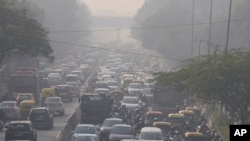The United Nations' top climate body says drastic measures, including significant cuts in fossil fuel use, are necessary to contain global warming to 1.5 degrees Celsius above preindustrial temperatures.
Monday's report by the Intergovernmental Panel on Climate Change showed that the world is "on a fast track to climate disaster" and that governments and organizations have engaged in "a litany of broken climate promises," said U.N. Secretary-General Antonio Guterres.
"It is a file of shame, cataloguing the empty pledges that put us firmly on track towards an unlivable world," he said in a video message released alongside the report.
Guterres said the world's current trajectory is global warming of more than double the 1.5-degree limit agreed at climate talks in Paris in 2015.
To keep the 1.5-degree limit within reach, he said that the world would need to cut global emissions by 45% this decade.
The 2,800-page report said only such severe emissions cuts this decade could turn the situation around. Even then, it said such measures would need to be combined with governments planting more trees and developing technologies that could remove some of the carbon dioxide already in the atmosphere.
"It's now or never," IPCC report co-chair James Skea said in a statement with the report.
"Without immediate and deep emissions reductions across all sectors, it will be impossible," he added.
The report said that in the next three years — by 2025 — the world would need to stop greenhouse gas emissions from rising further to be on track to reach the Paris goals. If current policies continue, the report said, the 1.5-degree target will be "beyond reach," and it will be harder after 2030 to limit warming to 2 degrees Celsius.
Guterres put the blame on governments and businesses but did not single out individual countries.
"Some government and business leaders are saying one thing but doing another."
"Simply put, they are lying," he added. "And the results will be catastrophic."
U.S. Secretary of State Antony Blinken said in a statement that the report "reveals how current global efforts to mitigate the climate crisis fall far short of what is needed" and that this will be a "decisive decade."
He cited some of the report's recommendations to halt climate change, from "improving energy efficiency, to halting and reversing global deforestation, to deploying more sustainable transportation and clean energy." If countries take action now, he added, they can halve global emissions by 2030.
Some information in this report came from The Associated Press, Reuters, and Agence France-Presse.






